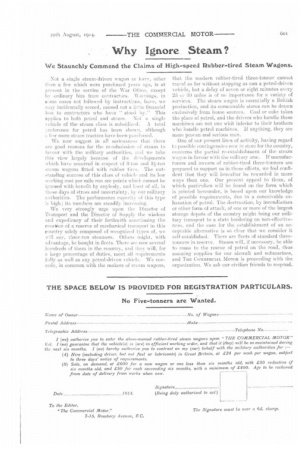Why Ignore Steam?
Page 3

If you've noticed an error in this article please click here to report it so we can fix it.
We Staunchly Commend the Claims of High-speed Rubber—tired Steam Wagons.
Not a single steam-driven wagon or lerrF, other than a few which were purchased years ago, is at present in the service of the War Mice, except .ordinary hire from contractors. Warnings, in some cases not followed by instructions, have, we may incidentally record, caused not a little financial loss to contractors who have " stood by." This applies to both petrol and steam. Not a single %chicle of the steam class is subsidized. A total preference for petrol has been shown, although a few more steam tractors have been purelinsed.
We now suggest in all seriousness that there are good reasons for the re-admission of steam to favour with the military authorities, lind we take this view largely because of the developments winch have occurred in respect of 3-ton and 3-4-ton steam wagons fitted with rubber tires. The. outstanding success of this class of vehicle and its low working cost per mile run are points wliich cannot be ignosed with benefit by anybody, and least of all, in these days of stress and uncertainty, by our military authorities. The performance capacity of this type is high; its numbers are steadily increasing.
We very strongly urge upon the Director of Transport and the Director of Supply the w6sioin and. expediency of their forthwith sanctioning the ercaVon of a reserve of mechanical transport in this country solely composed of recognized types of, we will say, three-ton steamers. Others might, with advantage, be bought in fleets. There are now several hundreds of themin the country, and they will, for a 1-arge percentage of duties, meet all requirements fully as well as any petrol-driven vehicle. We concede, in common with the makers of steam wagons, that the modern rubber-tired three-tonner cannot travel as far without stopping as can a. petrol-driven vehicle, but a delay of seven or eight minutes every 2i; or 80 miles is of no importance for a variety of services. The steam wagon is essentially a British production, and its consumable stores can be drawn exclusively from home sources. Coal or coke takes the place of petrol, and the drivers who handle these machines are not one whit inferior to their brothers who handle petrol machines. If anything, they are more proven and serious men.
One of our present lines of activity, having regard to possible contingencies now in store for the country, concerns the partial re-establishment of the steam wagon in favour with the military erne Tf manufacturers and owners of rubber-tired three-tonners are prepared to support us in these efforts, we feel confident ORA they will hereafter be rewarded in more ways than one. Our present appeal to them, of which particulars will be found on the form which is printed hereunder, is based upon our knowledge of possible requirements, due to a conceivable exhaustion of petrol. The destruction, by ineendiarism or other form of attack, of one. or more of the largest storage depots of the country might bring our military transport to a state bordering on non-effectiveness, and the case for the establishment of an acceptable alternative is so clear thatwe consider it self-established. There are fleets of standard threetonners in reserve. Steam vihl, if necessary, be able to come to the rescue of petrol on the road, thus assuring supplies for our aircraft and submarines, and THE COMMERCIAL MOTOR is proceeding with the organization. We ask our civilian friends to respond.






































